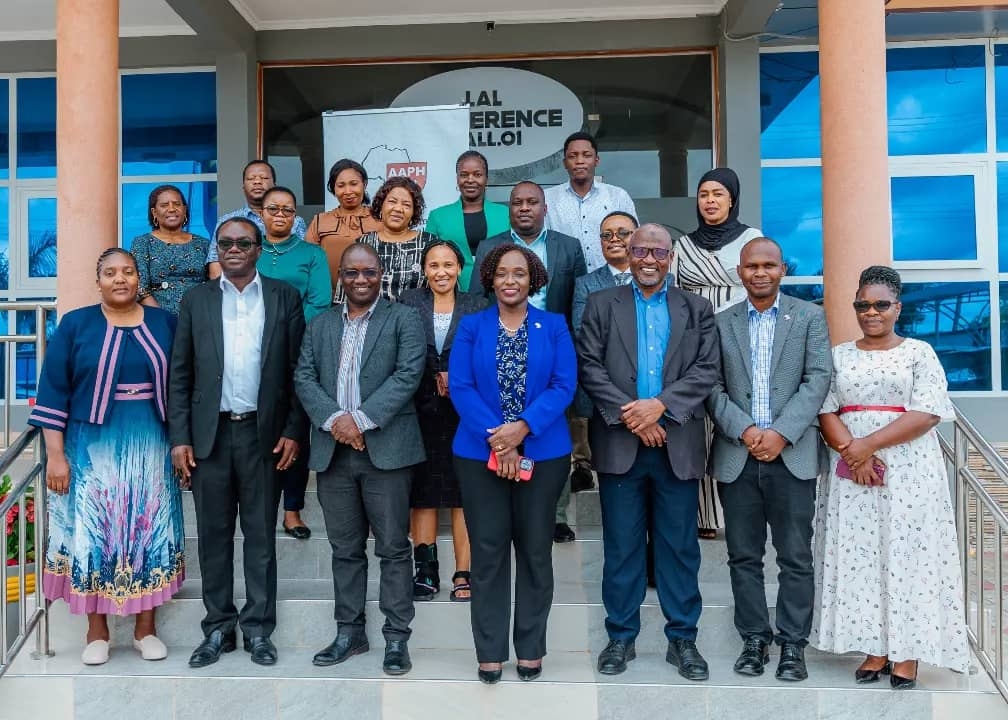
On April 17th 2024, the Africa Academy for Public Health (AAPH) in collaboration with the Muhimbili University of Health and Allied Sciences (MUHAS) and the Ifakara Health Institute (IHI) convened a one-day meeting to disseminate the Calcium trial findings to officials at the Ministry of Health (MoH) and the President’s Office Regional Administration and Local Government (PO-RALG).
The dissemination meeting to MoH and PORALG stems from the launch of the Calcium trial findings conducted during the 5th ARISE Annual Scientific Symposium conducted on 19th January 2024. During her remarks at the launch, the Minister of Health Hon. Ummy Mwalimu asked the investigators to share these important findings with the technical teams at the MoH and PO-RALG.
Dr. Mary Mwanyika Sando, Chief Executive Officer at Africa Academy for Public Health gave opening remarks and welcomed the delegates to the event. Among the delegates were Dr. Mohamed Ahmad Makuwani (Director of Reproductive, Maternal, and Child Health - MoH) and Dr. Rashi Mfaume (Director of Health, Social Welfare, and Nutrition Services – PO-RALG). Dr. Mary set the stage by explaining the burden of hypertensive disorders of pregnancy on maternal and child health, and the role of calcium supplementation in reducing preeclampsia and preterm births. She introduced the series of presentations that were to be made and urged the delegates to engage in vibrant discussions.
Dr. Alfa Muhihi, Clinical Trials Manager at Africa Academy for Public Health delivered a presentation covering three components i.e., the Clinical trial, Implementation cohort, and Cost-effectiveness analysis.
The clinical trial aimed to assess the effectiveness of lower-dose calcium supplementation (500mg/day) compared to the currently recommended high-dose (1500mg/day) in reducing preeclampsia and preterm birth. The Implementation cohort aimed at assessing the barriers and enablers of implementing the currently recommended high-dose calcium supplementation under routine antenatal care services. The cost-effectiveness analysis was conducted to assess the cost-effectiveness of low-dose calcium supplementation in low and middle-income countries (LMICs) with low dietary calcium intakes.
Overall, the low-dose calcium supplementation (500mg/day) was as effective as the high-dose calcium supplementation (1500mg/day) in reducing the risk of preeclampsia and preterm birth. Findings from the implementation cohort indicated that high-dose calcium supplementation was acceptable, but adherence to three doses per day was a big challenge. The cost-effectiveness analysis indicated that low-dose calcium supplementation would produce substantial health benefits and be highly cost-effective in almost all LMICs with low dietary calcium intake. Based on the findings, the research team concluded that it is high time to revisit high-dose calcium supplementation for Tanzania and other LMICs to afford and implement routine calcium supplementation.
Dr. Makuwani commended the team for a well-designed and executed study that has led to these findings. He pointed out the Government's willingness to implement calcium supplementation by adopting the WHO-recommended guideline in the National ANC Providers’ Guide in 2018. He urged the research team to prepare a comprehensive policy brief including the efficacy of low-dose, feasibility/implementation, and cost-effectiveness analysis. He added that a policy brief will ignite the discussions toward implementation of routine low-dose calcium supplementation during pregnancy.
Prof. Andrea Pembe, the overall principal investigator of this calcium study in Tanzania, thanked the MoH and PO-RALG officials for making time and receiving the study findings. He affirmed that the team is committed to preparing and sharing a comprehensive policy brief soon after all the findings are published. The team will also continue to engage with the MoH and PO-RALG to increase awareness and advocate for the implementation of low-dose calcium supplementation.
